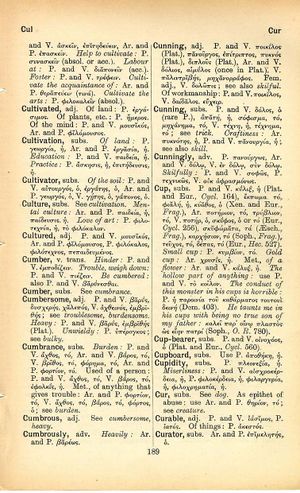cunning: Difference between revisions
From LSJ
Περὶ τοῦ ἐπέκεινα τοῦ νοῦ κατὰ μὲν νόησιν πολλὰ λέγεται, θεωρεῖται δὲ ἀνοησίᾳ κρείττονι νοήσεως → On the subject of that which is beyond intellect, many statements are made on the basis of intellection, but it may be immediately cognised only by means of a non-intellection superior to intellection
m (Woodhouse1 replacement) |
mNo edit summary |
||
| Line 15: | Line 15: | ||
[[prose|P.]] and [[verse|V.]] [[δόλος]], ὁ (rare [[prose|P.]]), [[ἀπατή]], ἡ, [[σόφισμα]], τό, [[μηχάνημα]], τό, [[verse|V.]] [[τέχνη]], ἡ, [[τέχνημα]], τό; see [[trick]]. | [[prose|P.]] and [[verse|V.]] [[δόλος]], ὁ (rare [[prose|P.]]), [[ἀπατή]], ἡ, [[σόφισμα]], τό, [[μηχάνημα]], τό, [[verse|V.]] [[τέχνη]], ἡ, [[τέχνημα]], τό; see [[trick]]. | ||
[[ | [[craftiness]]: [[Aristophanes|Ar.]] [[πυκνότης]], ἡ, [[prose|P.]] and [[verse|V.]] [[πανουργία]], ἡ; see also [[skill]]. | ||
}} | }} | ||
Revision as of 12:41, 20 May 2020
English > Greek (Woodhouse)
adjective
P. and V. ποικίλος (Plato), πανοῦργος, ἐπίτριπτος, πυκνός (Plato), διπλοῦς (Plato), Ar. and V. δόλιος, αἱμύλος (once in Plato).
Fem. adj., V. δολῶπις; see also skilful.
of workmanship: P. and V. ποικίλος, V. δαίδαλος. εὔχειρ.
substantive
P. and V. δόλος, ὁ (rare P.), ἀπατή, ἡ, σόφισμα, τό, μηχάνημα, τό, V. τέχνη, ἡ, τέχνημα, τό; see trick.
craftiness: Ar. πυκνότης, ἡ, P. and V. πανουργία, ἡ; see also skill.

